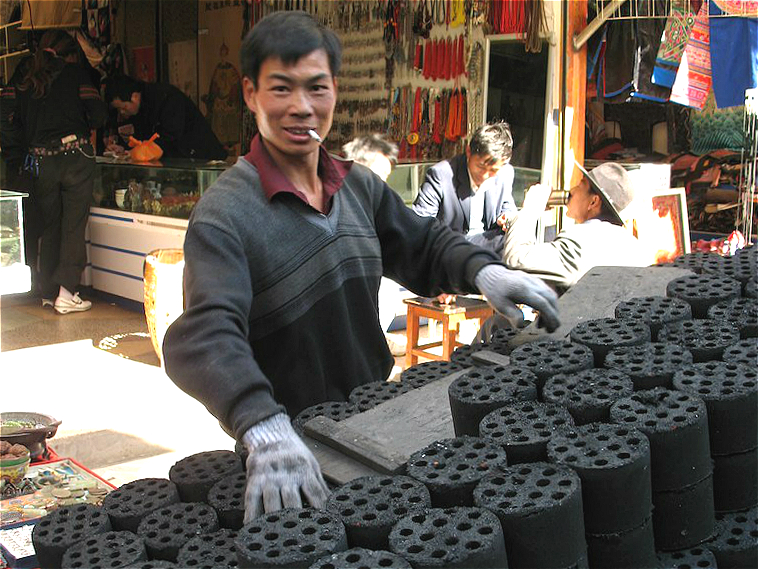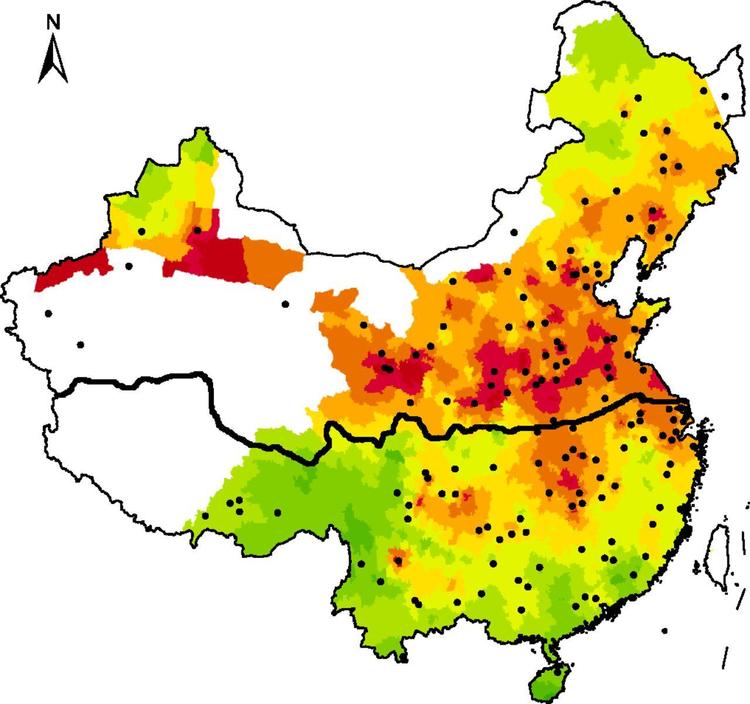Feng Hao | (ChinaDialogue) | – –
Lives in northern China are shorter than in the south because of air pollution from heating, reports Feng Hao

In Beijing, the switch from coal to gas heating has reduced levels of tiny particles (PM2.5 and PM10) in November by 55% and 46% on last year (Image: Nick McIntosh)
Each year, the winter chill creates a rift between China’s north and south based on radically different policies when it comes to heating, and with consequences for air pollution and life expectancy.
In the 1950s, premier Zhou Enlai drew a line across the country following the River Huai and the Qinling mountains. North of the line, temperatures in January fall below zero degrees whereas in the south temperatures remain above freezing. This difference led the government to provide district heating in the north, which relies on centralised coal-fired boilers to provide free or heavily subsidised heat. In the south, no district heating was provided.
Over half a century later this system remains in place. It means that hundreds of millions of residents in northern China enjoy reliable and affordable heating, while those in the south depend on air conditioning units, electric heaters, and blankets to make it through winter – and get no subsidies. For some people, the provision of heating is a consideration when choosing where to live.
But northerners are paying for their warmer winters with their health, according to research published in Proceedings of the National Academy of Sciences.
The toll
According to the study, burning coal to power district heating produces air pollution that is harmful to human health, with the average life expectancy in the north 3.1 years shorter than in the south.
The research was carried out jointly by academics from the US, Israel and Hong Kong and involved a quantitative analysis of the link between life expectancy and inhalation of particulate matter – with the north-south difference in heating policy the variable studied.
The researchers looked at the causes of death regionally from 2004 to 2012, recorded in China’s national disease monitoring database. They then analysed it in combination with air pollution data going back to the 1980s.
They found that local heating policies have a major impact on the levels of tiny particles (PM10) in the air. Long-term exposure to PM10 increases the incidence of heart and respiratory diseases and reduces expected lifespan.
The research found a steep increase in air pollution moving from the south of the country to the north. People in areas that benefit from heating subsidies see PM10 levels raised by 41.7 micrograms per cubic metre, on average. This contributes to a reduction in lifespan of 3.1 years and a 37% greater incidence of death from heart disease and stroke.
Air pollution map of China
Key: Green, yellow and red marking low, medium and high levels of PM10 pollution, respectively.
Source: Ebenstein, Avraham, et al. "New evidence on the impact of sustained exposure to air pollution on life expectancy from China’s Huai River Policy". Proceedings of the National Academy of Sciences (2017)
Energy reform heats up
He Guojun, assistant professor at Hong Kong University of Science and Technology and one of the report authors, says the research is not a criticism of the heating policy itself, nor is it calling for it to be abolished.
The paper does not offer any specific policy suggestions. But He Guojun said that to reduce air pollution many cities have switched to using natural gas or electricity to power homes and other buildings instead of burning coal. This approach can deliver enormous long-term health and welfare benefits.
“It’s not the case that you have to choose between heating and clean air,” he stressed.
The government has been working to reform heating provision in recent years, in line with wider efforts to curb air pollution from industry. The implementation of the 2013-2017 Air Pollution Action Plan means that some factory operations are either stopped or restricted during peak pollution months .
In September, the Ministry of Housing and Urban Rural Development, the National Development and Reform Commission, the Ministry of Finance and the National Energy Administration published guidance on cleaner heating provision for 13 provincial-level governments. It required changes by winter, including the preferential use of electricity or natural gas over coal, according to local availability . . .
A coal-dominated energy mix is a major cause of China’s air pollution, Liu added, stressing that ongoing reforms were essential to tackling air pollution.
Via ChinaDialogue
This work is under Creative Commons’ Attribution-NonCommercial-NoDerivs 2.0 England & Wales License and 2.5 China License.



 © 2025 All Rights Reserved
© 2025 All Rights Reserved